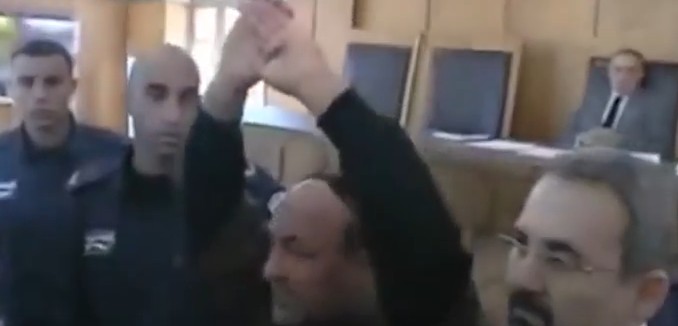In the latest reaction to a widely criticized decision by The New York Times to publish an op-ed by Palestinian terror chief Marwan Barghouti, without initially identifying him as a convicted killer, a former Israeli general detailed Barghouti’s extensive terror connections and culpability for some of the deadliest attacks of the second Palestinian intifada.
Brig. Gen. (res.) Yossi Kuperwasser, formerly the director general of Israel’s Ministry of Strategic Affairs and head of the Research Division of IDF Military Intelligence, wrote that Barghouti “was the leader and commander of the Al-Aqsa Brigades, the key terror component of Fatah that carried out many terror attacks throughout the Second Intifada.”
The al-Aqsa Brigades was blacklisted as a terror organization by the United States, Canada, Japan, New Zealand, and the European Union. Under Barghouti’s leadership, it helped escalate the second intifada by launching numerous terrorist attacks against civilians. These included the January 2002 Bat Mitzvah massacre, in which a Palestinian gunman killed six people at a birthday celebration for a 12-year-old Jewish girl, as well as the March 2002 Yeshivat Beit Yisrael massacre, in which a Palestinian suicide bomber killed eleven Israeli civilians, including two infants, three children, and two teenagers.
Barghouti also gained prominence as the leader of Fatah’s Tanzim, which carried out multiple terrorist attacks against Israeli civilians, including children, during the second intifada.
Barghouti was arrested by Israel in April 2002 and charged in relation to suicide bombings and shooting attacks that claimed the lives of hundreds of Israeli civilians and soldiers, and wounded hundreds more. He was convicted by a civilian court in May 2004 of his involvement in three terrorist attacks in Israel that killed five people: Yosef Habi (52, from Netanya), Eli Dahan (53, from Lod), policeman Sgt.-Maj. Salim Barakat (33, from Yarka), Yoela Chen (45, from Giv’at Ze’ev), and Greek Orthodox monk Georgios Tsibouktzakis (34, from the St. George Monastery).
Kuperwasser also observed that documents captured by Israeli forces showed that Barghouti sought Yasser Arafat’s approval for payments to terrorists.
In 2012, Haaretz reported on the details of Barghouti’s interrogation and showed that he had advance knowledge of the attack that killed Habi, Dahan, and Barakat.
The interrogators pressure Barghouti to reveal what he knows about the Sea Food Market incident. “The subject mentioned that he did in fact know prior to the attack that it was under way. He found out from Ahmed Barghouti and he himself instructed Ahmed that the attack be carried out only in the occupied territories and that it be carried out either in a settlement or at a military checkpoint between Ramallah and Jerusalem.” Both Barghoutis discussed the issue and then, Marwan testifies, he “went back to his own affairs and went to sleep.”
The following morning (on March 6, 2002 ), Barghouti he spoke to Ahmed, who reported that the attack had taken place in the end in a Tel Aviv restaurant. “The subject was very surprised” and invited Ahmed for a clarification. The young Barghouti said that “Nasser Awis’ boys did in fact try to achieve the objective, but because of some problem they decided to transfer the attack to Tel Aviv.”
Jamal Barakat, brother of the late Salim Barakat, blasted Barghouti following the publication of his op-ed in the Times, saying that he did not belong “among free people” and is “a man who plans, who assists, who sends terrorists to hurt those who are innocent.”
On Tuesday, the public editor of the Times criticized the paper’s initial failure to acknowledge Barghouti’s crimes, saying that the omission risked “the credibility of the author and the Op-Ed pages.”
[Photo: TheJerusalemCenter / YouTube ]




